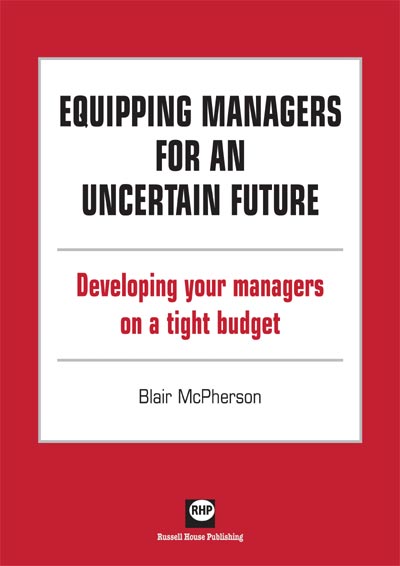Equipping Managers for an Uncertain Future
The only certainties in life are death and taxes. When it comes to management we could add that the job you are doing now will not be the job you are doing in two or three years time. The pace of change is getting faster and managers need to be equipped to keep up. We no longer train people for a management post; we require all managers to have a set of core management competences which include managing finance, managing information, managing equipment and buildings and, most significantly, managing people. Managers’ people management skills are often summed up as leadership skills, that is, the ability to inspire staff and the willingness to take responsibility. These leadership skills also include the ability to influence and shape decision-making and the ability to network and develop partnerships. Skills which become even more relevant in a harsh financial climate when managers are required to do more with less, to increase their spans of responsibility, to negotiate new ways of working and to keep partners on board when their instincts are to retreat to their core business.
This type of manager requires a management development programme which aims is to develop generic managers, people with transferable management skills, people who have the confidence and ability to move from one service to another, people who are equipped for a fast changing and uncertain future.
Through executive coaching, management learning sets and mentoring, individuals are encouraged to use the material in this manual to explore a range of typical management issues, to think about how their behaviour affects others and to identify the type of management behaviour their organisation is seeking to encourage.
The manual is divided into five parts. Each part describes a different management development technique, explains how it works and provides learning and discussion material. At the end of each piece of discussion material there are three questions to stimulate debate.
Part One is about executive coaching. The thinking behind this approach is that to develop as a manager you need to see yourself as others see you. You can get this feedback from those you work with or you can get it from an independent person – a coach who observes you in action and then discusses with you what they saw. The more honest the feedback the more useful it is in identifying what you need to work on. The material includes an example of a 360 degree feedback questionnaire which can be adapted to focus on people management/ leadership skills.
Part Two is about management learning sets. The idea is that managers can learn a lot from each other by sharing their experience. Managers from different professional backgrounds and different areas of business often think their problems are unique; they are not. The material in part two can be used to focus the group around typical management tasks like hiring, firing and inspiring staff or a discussion about how to ‘do more with less’. At some point in their career a manager is going to feel vulnerable, maybe in relation to tackling a member of their team over their attendance record or an accusation from an employee of discrimination or bullying. As HR restrict themselves to impartial advice and your line manager distances themselves, it is good to know that others in the group have been through this, and that being the subject of a grievance or complaint does not make you a bad manager.
Part Three is about mentoring. The idea is that every manager can benefit from guidance from a more experienced manager. A mentor shares their wisdom. Initially people tend to use their mentor for career advice help with putting together a CV or job application and preparing for an interview. A mentor can advise on how to deal with a difficult boss or an unhelpful colleague. A good mentor can also make you reflect on your management style. Often a mentor will say I am a resource, use me as you see fit, we can discuss whatever you like. But the mentee is uncertain about what issues to raise and how to go about it. The material in part three provides some relevant topics to explore together.
Some people are not managers, they think they would like to be a manager but they are not sure what managers do. Part Four is designed to help these aspiring managers. The material provides typical management scenarios, helps with the language of management and provides an opportunity to make an informed decision about becoming a manager rather than just falling into it.
Developing managers on a tight budget is all about providing them with material that is relevant to the day job, which answers practical questions, addresses topical issues and explores phrases that have suddenly become management speak. The material in Part Five supplements the material elsewhere in the manual. It focuses on life as a manager at a time of budget cuts, services reductions and redundancies. The aim is to get the reader thinking and talking about how you keep staff motivated, how you keep customers satisfied and how you change your management style in the new financial climate.


